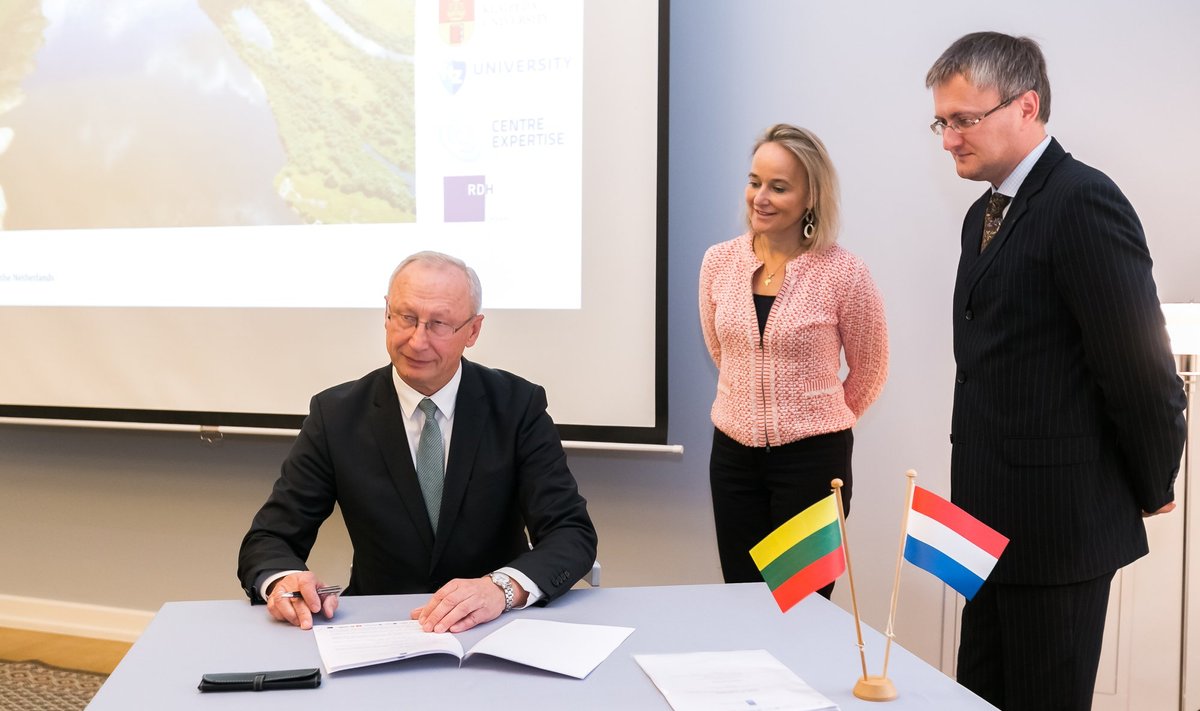A letter of cooperation was signed on the 19th of October between Dutch and Lithuanian Partners in education at the Embassy of the Kingdom of the Netherlands in Vilnius which will allow institutions in both countries to work together on sustainable development around the River Nemunas.
"The document creates a framework for cooperation and allows us to build an international network for Dutch and Lithuanian educational, knowledge and research institutes," explains Dutch Ambassador Bonny Horbach who together with the advisor to the Minister of Education and Science, Marius Ablačinskas, witnessed the signing.
The signing Letter is a direct result of series meetings and consultations that started in the beginning of 2018. They were initiated by RDH Urban together with Dutch Centre of Expertise Delta Technology with a support of the Dutch Embassy in Vilnius. Other partners involved in cooperation are: Klaipėda University, Klaipėda State University of Applied Sciences (KVK), Kaunas University of Technology, Aleksandras Stulginskis University (ASU), RDH Urban, Centre of Expertise Delta Technology representing HZ University of Applied Sciences, Hogeschool Rotterdam and Hogeschool Van Hall Larenstein.
"There is a common belief of all the signatories that an international network of well qualified knowledge sources will create an added value for cooperation," emphasized the advisor, who added, "Developing program of activities, which will be executed within a time-frame of 3-5 years, will strengthen solid and long lasting strategic cooperation between Dutch and Lithuanian Partners."
The Letter of Cooperation is the next step in Lithuanian-Dutch cooperation and encourages knowledge exchange and joint execution of educational, scientific and research projects. This year February Dutch Embassy hosted the first meeting for all Partners, which opened up possibilities to further deepen the bilateral cooperation. The program of activities that is being developed is mutually beneficial and focuses on issues of sustainable development with a special focus on, i.a.: integrated water management, climate adaptation, nature preservation, processes of transition of urban and rural areas around river Nemunas.
'It will not be a cooperation "on paper" only," declared Jouke Heringa coordinator international relations and cooperation in education and applied research of the Dutch Delta Academy. "Our cooperation is already a fact. During the last year two groups of international students and lecturers from Delta academy started research near Curonian lagoon with the help of Klaipėda University. In a few weeks we will be back with a third group at the Aleksandras Stulginskis University, to start inventory of the Nemunas area near Kaunas. We are looking forward to an active interaction between universities, in which we want to introduce cooperative applied researches.'
Huub Droogh Partner of RDH Urban is another cooperation partner. He adds 'Making the Nemunas River Basin a case study for some of topics like climate adaptation, water management etc will contribute to an interesting educational offer for students, will offer us a better understanding of the local challenges and can provide us with a perfect foothold to build an innovative ecosystem of cooperation for this area." The Nemunas River Basin area covers an interesting part of the country reflecting the diversified of socio-economic situation as well as an environmental and ecological challenge.
Developing research, knowledge and innovation transfer is one of the three pillars based on which the cooperation can develop. The other two pillars are linked to governance and business. According to Dutch Ambassador Bonny Horbach, it is worth to stress the importance of a signed Letter of Cooperation signifying the start of bilateral cooperation on a long term project. 'It is a win-win-win project. Dutch students get invaluable experiences cooperating with their Lithuanian counterparts. In the meantime, Dutch organisations can test if our experience with an integrated social, economic and spatial management model could contribute to Lithuania's social-economic development. And thirdly, it will continue to solidify the valuable bilateral relations between our countries within European Union' – summarized the Ambassador.
Dutch involvement in the field of integrated spatial-economic development in Lithuania is already ongoing process. Over last two years RDH Urban, the initiator of the cooperation, contributed to the development of a new strategy for the Free Economic Zone in Klaipėda as well as Klaipėda's Economic Development Strategy.
